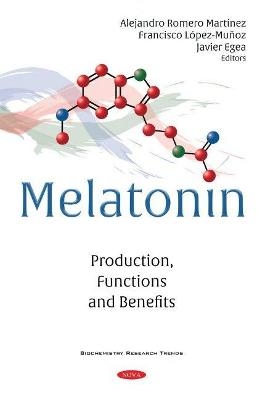The exponential influx of scientific research on melatonin is associated with a greater orientation towards the study of the systemic effects of melatonin and their derivatives, as well as their clinical implications. Proof of this fact is summarized in the present compilation, where melatonin is presented as a remarkable agent to counteract most of the physiopathological events that trigger several disorders. The book also collects evidence about melatonin's interactions with two high-affinity G protein-coupled receptors to provide new pharmacological targets for the treatment of cancer, neurological or endocrine conditions. The present review also includes detailed coverage of molecules with improved safety profiles and melatonin receptor agonists (such as ramelteon, tasimelteon, and agomelatine), and the latest findings on the role of melatonin in protecting plants from abiotic stress, improving their resistance to adverse conditions, regulating several environmental stresses including heat stress, as well as the clinical use of melatonin in the treatment of fertility-related problems and reproductive health. The multiplicity of actions of melatonin, including modulating immune responses and inflammation and maintaining mitochondrial integrity, make this indoleamine a valuable therapeutic agent in the treatment of neurodegeneration, polycystic ovary syndrome, brain ischemia and traumatic brain injury, fibromyalgia, optic neuritis and glaucoma, alone or in combination with other drugs. Melatonin easily crosses the blood-brain and placental barriers. In this sense, this book provides a complete review suggesting that melatonin supplementation should be considered as a potential disease-preventing agent, with the aim of extending pregnancy duration to improve clinical outcomes and prevent fetal brain damage for pregnancy pathologies, such as preeclampsia, intrauterine growth restriction and preterm birth. Within the last few decades, melatonin has emerged in clinical oncology as a naturally occurring bioactive molecule with substantial anticancer properties. In addition, this chronobiotic agent exerts oncostatic effects throughout all stages of tumor growth, from initial cell transformation to mitigation of malignant progression and metastasis. Its therapeutic applications in oral cancer, gastrointestinal pathologies and colorectal cancer are discussed, as well as its applications as an adjuvant for alleviating side-effects and improving the welfare of radio/chemotherapy-treated patients. In the final chapter, the authors summarize the indications for the development of new galenic formulations of melatonin. Thus, different melatonin formulations, such as intranasal solutions, sprays, microspheres, gels and liposomes would allow for the maintenance of endogenous active concentrations for a long time, avoiding poor oral bioavailability.
Preface; Scientific Production on Melatonin from a Bibliometric Perspective; Function and Pharmacology of Melatonin Receptors; The Ubiquity and Role of Melatonin in Plant Metabolism and Response to Abiotic Stress; Synchronization of the Circadian Rhythms by Melatonin in Vertebrate and Invertebrate Species; Extrapineal Melatonin: A Hormonal Microcircuit for Local Adaptations; Heat Stress Amelioration Effects of Melatonin in Goats; Melatonin and Its Functions in Andrology; Environmental Toxicant Compromised Reproductive Health: Rescue by Melatonin; Melatonin as an Adjuvant Therapy in the Polycystic Ovary Syndrome: Focusing on the Overweight/Obese Phenotype; The Role of Melatonin in Neurodegeneration; Cerebral Ischemia and Traumatic Brain Injury: Protection by Melatonin; The Effects of Melatonin on Fetal Neuroprotection; Melatonin Protects the Optic Nerve and the Retina against Experimental Optic Neuritis and Glaucoma; Melatonin Benefits in Oral Cancer; Synthesis, Localization and Biological Effects of Melatonin on Intact and Diseased Intestine; The Role of Melatonin in Fibromyalgia Syndrome; Clinical Use of Melatonin in the Treatment of Sleep Disorders and Future Prospects; Galenic Forms for Melatonin: Present and Future; Index.
| Erscheinungsdatum |
29.01.2021
|
| Sprache |
englisch |
| Gewicht |
908 g |
| Themenwelt
|
Naturwissenschaften ► Biologie ► Biochemie |
| ISBN-10 |
1-5361-9031-4 / 1536190314 |
| ISBN-13 |
978-1-5361-9031-1 / 9781536190311 |
| Zustand |
Neuware |



